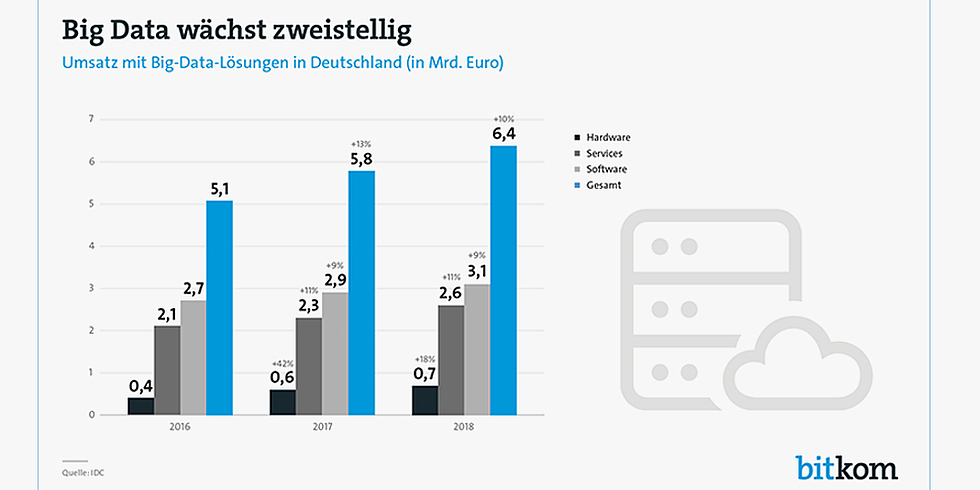Growing market for Big Data
Big data is becoming a growing component of technological progress and digitalisation.
According to an estimate given by the Federal Association for Information Technology, <link https://www.bitkom.org/>Bitkom</link>, the big data sector will be generating approximately 6.4 billion Euro in 2018, which is the equivalent of an increase of ten percent. The following fields can expect to experience growth:
- Turnover in the field of hardware will probably rise by 18% to 671 million Euro.
- The software sector will generate the highest turnover of 3.1 billion Euro, reporting an increase of 9%.
- According to forecasts, big data services are expected to generate 2.6 billion Euro, which corresponds to an increase of 11% compared to the previous year.
What is big data?
Big data is generally understood as the processing of large volumes of data that are in turn used for a variety of purposes. Generally, one can say that companies that use big data marketing yield higher profits. The reason for this is their direct contact with the consumers. Research and development departments are able to implement customer feedback and usage behaviour directly. The results are a higher customer satisfaction, stronger customer loyalty, and positive word-of-mouth recommendation. In particular, the latter one is an effect that must not be underestimated, as potential new customers often rely more on the opinion of friends, acquaintances, relatives or positive customer reviews than on traditional advertising.
What applications can big data be used for?
The healthcare sector benefits from big data as well, with so-called wearables and smartphone apps supplying the user with useful information about their own bodily functions and helping towards a more healthy diet and a more efficient workout. In the medical field, data can be collected on a clinical and molecular genetic basis in order to optimize medical care of patients. In the future, diseases could be prevented, instead of merely responding to them.
Further, in the field of emergency management, the era of big data is opening up numerous new possibilities for preventive measures, more rapid responses during and after emergencies, including analysis of disaster management exercises, protection of critical infrastructure such as hospitals, and early identification of potential hazards. During an emergency, one can gain an overview in real-time. Emergency services can respond to hazards more efficiently and provide help and support. After an emergency, data can be analysed to identify possible weak spots, providing greater security and safety in the case of future emergencies.
Last, but not least – big data has also a positive effect on economic development:
New jobs, businesses and startups arise, carrying out the evaluation of collected data and implementing the insight gained thereby. Data scientist, data visualizer, data architects and data engineer will be sought-after professions in the future. Moreover, Bitkom-Akademie in Berlin currently offers adequate opportunities for further training in order to prepare Germany for this promising economic sector.


